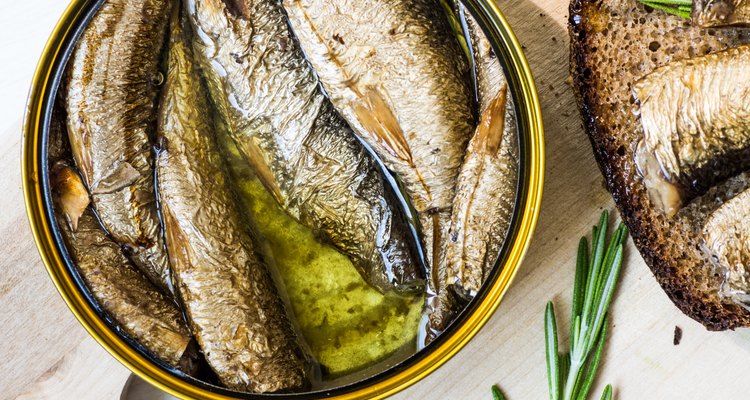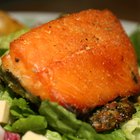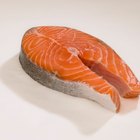
Photosiber/iStock/Getty Images
Chicken of the Sea is well known for its tuna fish. In fact, this company has a number of products available, such as oysters, salmon, shrimp and sardines. Sardines are harvested when they are small and placed in cans which can be stored for long periods of time. These can be used as snacks or in conjunction with an entire meal.
Calories
Sardines are packed in various types of liquids. Chicken of the Sea uses mustard sauce, tomato sauce, oil and water. This causes the calorie contents to vary. The sardines packed in water, for example, contain 100 calories per can, while the sardines packed in oil contain 190 calories. A can is equal to 3.75 oz.
Protein and Carbohydrates
Protein and carbs are needed in high amounts by the body for proper functioning. Protein helps repair muscle tissue from workouts, and carbs are used for physical and mental energy. All varieties of Chicken of the Sea sardines have only 2 g of carbs per can. The sardines packed in mustard sauce have the highest protein content with 17 g.
Sodium
With the exception of the sardines packed in water and oil, all varieties have 490 mg of sodium. Sodium is beneficial for muscle contractions and blood volume regulation in the body. According to Colorado State University, the minimum daily requirement for sodium is 1,500 mg and the maximum recommended level is 2,300 mg.
Benefits
All types of Chicken of the Sea sardines contain fat. The type packed in oil contains 14 g of total fat and 6 g of saturated fat. On the plus side, sardines also contain a healthy type of unsaturated fat called omega-3. Omega-3 fatty acids decrease triglyceride levels and reduce the build-up of plaque in the arteries, according to the American Heart Association.
Miscellaneous Nutrients
Chicken of the Sea sardines contain a number of other nutrients. Sardines in tomato sauce, for example, contain 30 percent of the daily value of calcium, 6 percent of the daily value of iron, 6 percent of vitamin A and 4 percent of vitamin C. The calcium content is high because of the bones in the sardines. According to the National Institutes of Health, calcium is important for muscle contractions, muscle relaxation and blood clotting.
Related Articles

How to Cook Chicken Bratwurst

Brisling Sardines Nutrition

How to Slow Cook Brown Rice & Chicken

How to Par-Cook Chicken Before Frying

How to Cook Chicken Halves on a Weber ...

Calories in Chinese Food: Chicken ...

How to Marinate Roast Chicken

How to Fillet a Goliath Grouper

What Are the Benefits of Krill Oil on ...

How to Brine a Grilled Salmon

How to Cook Rockfish Fillets

Calories in Chicken Cacciatore

How to Smoke a Chicken in the Oven

How to Cook Chicken Thighs

Can You Substitute Beef Bouillon for ...

How to Make Crock-pot Chicken

How to Bake Italian Dressing Leg ...

How to Make Garlic Chicken

How to BBQ Salmon Fillets

Good Marinade for a Chicken & Steak ...
References
Writer Bio
I am very genuine and magnetic on camera, and have made numerous videos on my own for clients and other organizations that I'm affiliated with. I also have a degree in Sport Management, and multiple certifications to back up my validity. I've also been featured in three different exercise infomercials and had a speaking role in a National Lampoons movie.
Photo Credits
Photosiber/iStock/Getty Images